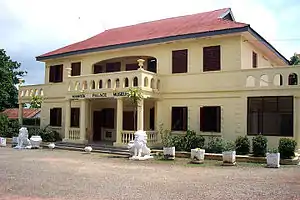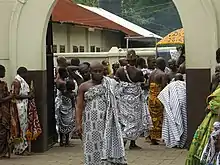Akwasidae Festival
The Akwasidae Festival (alternate, Akwasiadae) is celebrated by the Ashanti people and chiefs in Ashanti,[1][2] as well as the Ashanti diaspora. The festival is celebrated on a Sunday, once every six weeks.[2][3]
| Akwasidae Festival/Kwasi festival | |
|---|---|
 Manhyia Palace Museum where the festivals are held in [Accramost times Kumasi | |
| Observed by | Ashanti of Asanteman |
| Significance | Festival of commemoration of ancestors |
| Celebrations | Marks the seasons and the timings for various agricultural activities |
| Date | Sunday, once every six weeks |
| Frequency | 9 times per year |

Observance
The Akan annual calendar is divided into nine months which lasts approximately six weeks but varying between 40 and 42 days in a period; the celebration of this period is called the Adae Festival. The Adae Festival has two celebration days: the Akwasidae Festival is celebrated on the final Sunday of the period, while the Awukudae Festival is celebrated on a Wednesday within the period. The Friday preceding 10 days to the Akwasidae is called the Fofie (meaning a ritual Friday). As the festival is always held on Sundays (Twi in Kwasidae), its recurrence could be after 40 or 42 days in accordance with the official Calendar of Ashanti. During the last Akwasidae of the year, which coincides with the Adae Kese Festival, special attention is given to make food offerings and donations for helping people.[4] The festivals of Adae are not interchangeable as they were fixed from ancient times.[5]
Practices
The rites on this day relate to honouring personal and community ancestors. A gathering called Akom occurs in which drumming, dancing and singing are a normal celebration to honour Abosom (lesser gods in the Akan tradition) and Nsamanfo (spiritually cultivated ancestors).[6] Food offerings include special items such as eto (mashed African yam), garnished with hard-boiled eggs. Every Ashanti celebrates this festival.[7] For those Ashanti who do not observe the festival of Odwira, the Akwasidae is very important to commemorate their ancestors.[8]
On this day, the Asantehene (King of Ashante) meets his subjects and subordinate chiefs in the courtyard of the Manhyia Palace.[9][10] The Golden Stool (throne) is displayed at the palace grounds in the presence of the king, and people visit in large numbers, singing and dancing.[11][12] The king holds his durbar on the occasion of the festival, and people have the liberty to shake hands with him.[13] Before holding the durbar, the king goes in a procession in a palanquin decorated with gold jewelry. He also witnesses a colourful parade, from his palace grounds at Kumasi. Participants of the parade include drum beaters, folk dancers, horn-blowers and singers.[14] As it is festival of paying respect to ancestors, the king visits the Bantama Mausoleum and offers worship not only to his ancestors' chairs (stools), but also to the skeletal remains of his ancestors.[14] It is argued that, the king do not worship the stools and the ancestors, however to pay them homage.
References
- "Akwasidae festival: Ashanti Regional Police Command intensifies security". Citi 97.3 FM - Relevant Radio. Always. 2014-05-09. Retrieved 2020-02-26.
- "Festivals in Ghana". www.ghanaweb.com. Retrieved 27 December 2011.
- "Kofi Kingston Attends one of the Biggest Festivals in the Ashanti Region – Year Of Return". Retrieved 2020-02-26.
- Ghana, News. "AKWASIDAE OF THE AKANS?". Retrieved 2020-02-26.
- Braffi 2002, p. 10.
- "Festivals & Events in Ghana". TransAfrica. Retrieved 2020-02-26.
- Opokuwaa 2005, p. 92.
- Ayisi 1992, p. 83.
- Adjorlolo, Ruth Abla. "Asanteman marks Akwasidae festival". www.gbcghana.com. Retrieved 2020-02-26.
- "Manhyia Palace". Ghana Nation.com. Retrieved 24 November 2012.
- Pierre 2004, p. 55.
- Aidoo, Kwame. "Celebrating Akiwasidae with the Ashanti People of Kumasi, Ghana". Culture Trip. Retrieved 2020-02-26.
- "Otumfuo hosts Prince Charles to special Akwasidae". Graphic Online. Retrieved 2020-02-26.
- "Ghana Festivals". Ghana Photographers Resource.com. Retrieved 24 November 2012.
Bibliography
- Ayisi, Eric O. (1992). An Introduction to the Study of AfricanCulture. East African Publishers. p. 83. ISBN 9789966466174. Retrieved 24 November 2012.
- Braffi, Emmanuel Kingsley (2002). Akwasidae and Odwira festivals. Mystic House. p. 10. Retrieved 25 November 2012.
- Fuller, Linda K (2004). National Days/National Ways: Historical, Political, And Religious Celebrations Around THe World. Greenwood Publishing Group. p. 103. ISBN 9780275972707. Retrieved 24 November 2012.
- Pierre, Yvette La (2004). Ghana in Pictures. Twenty-First Century Books. p. 55. ISBN 9780822519973. Retrieved 24 November 2012.
- Opokuwaa, Nana Akua Kyerewaa (30 May 2005). The Quest for Spiritual Transformation: Introduction to Traditional Akan Religion, Rituals And Practices. iUniverse. pp. 92–. ISBN 978-0-595-35071-1. Retrieved 25 November 2012.
